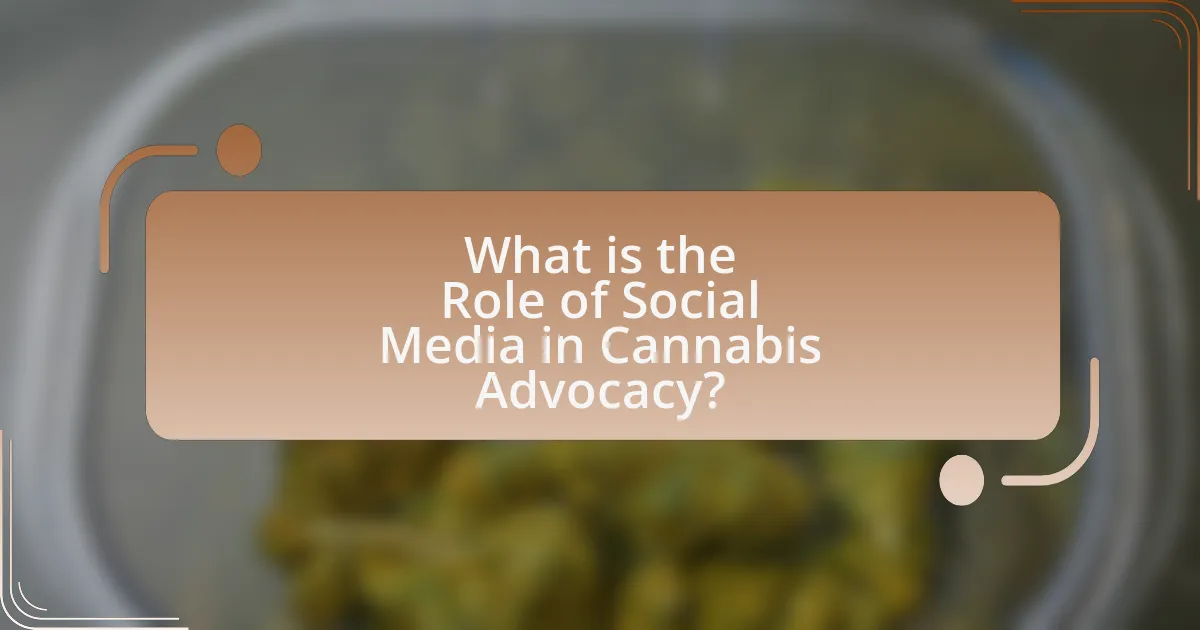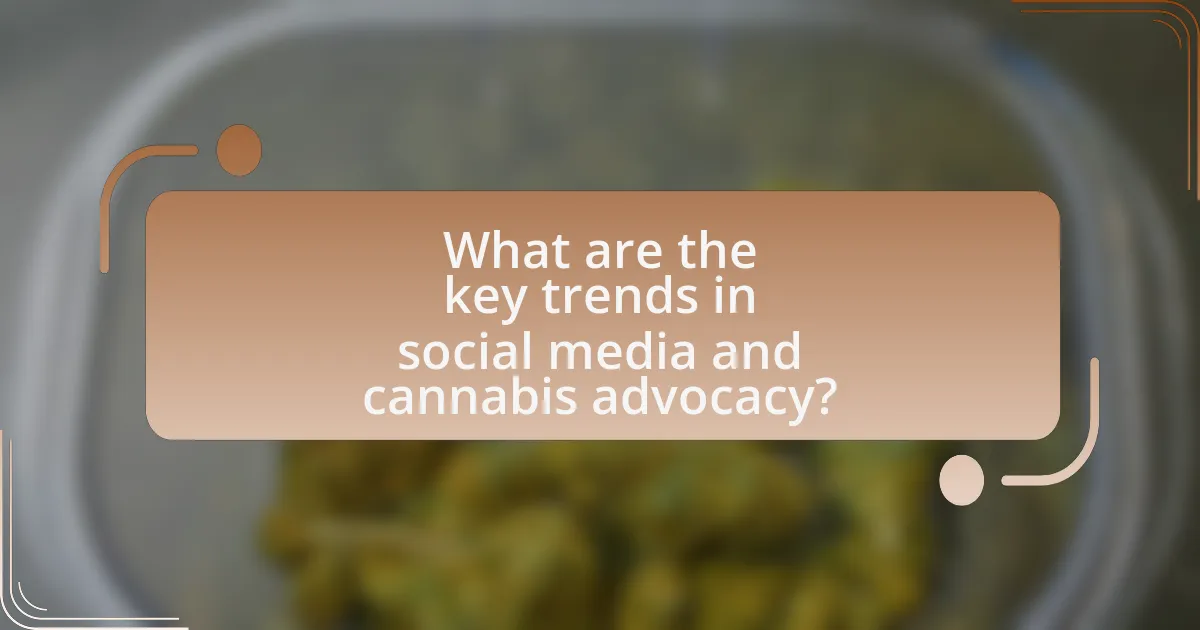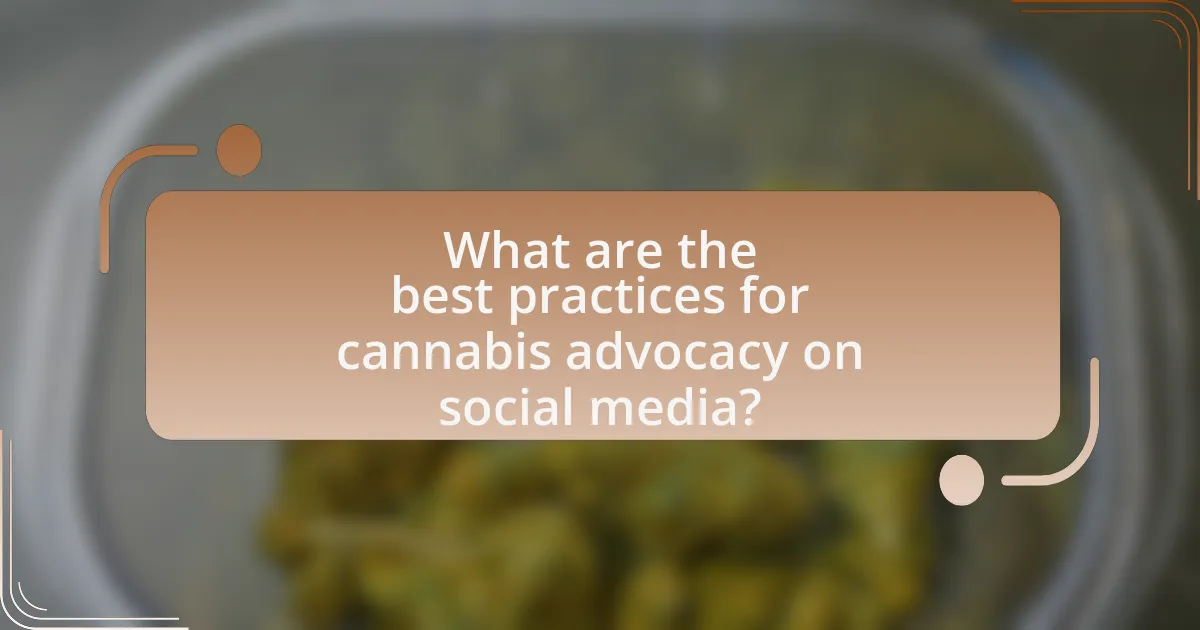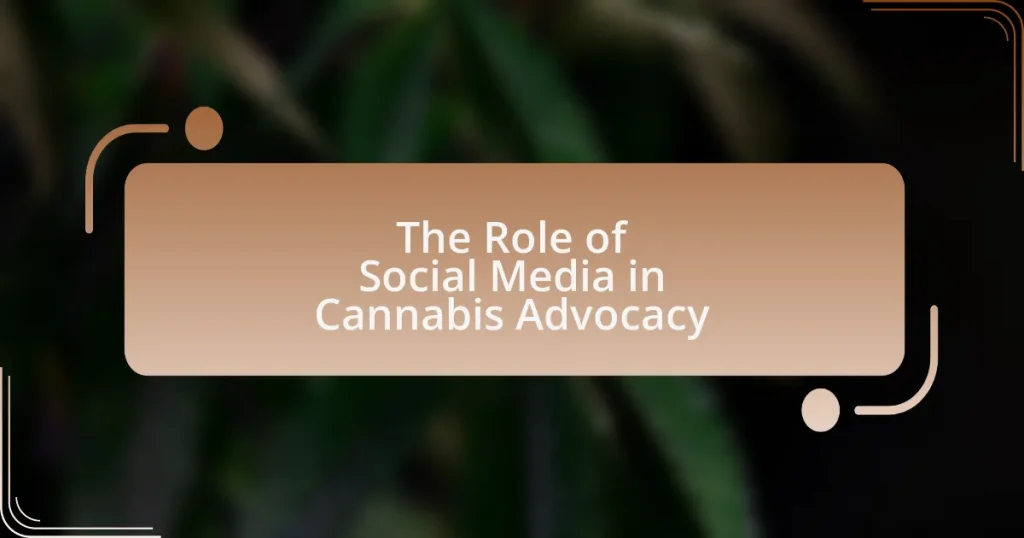The article examines the significant role of social media in cannabis advocacy, highlighting its effectiveness as a platform for education, community building, and mobilization. It discusses how social media has transformed advocacy efforts by enabling the rapid dissemination of information and fostering public engagement, particularly among younger demographics. Key platforms such as Facebook, Twitter, Instagram, and TikTok are analyzed for their influence in promoting cannabis legalization and countering misinformation. The article also addresses the challenges advocates face, including platform restrictions and the spread of misinformation, while offering strategies for effective engagement and content creation to enhance advocacy efforts.

What is the Role of Social Media in Cannabis Advocacy?
Social media plays a crucial role in cannabis advocacy by providing a platform for education, community building, and mobilization. It enables advocates to share information about the benefits of cannabis, counter misinformation, and promote legislative changes. For instance, campaigns on platforms like Twitter and Instagram have successfully raised awareness about cannabis legalization, leading to increased public support and policy shifts in various states. According to a study published in the Journal of Cannabis Research, social media engagement significantly correlates with public attitudes toward cannabis reform, demonstrating its effectiveness as a tool for advocacy.
How has social media transformed cannabis advocacy?
Social media has transformed cannabis advocacy by providing a platform for widespread information dissemination and community engagement. This transformation has enabled advocates to share personal stories, research, and legal updates rapidly, fostering a more informed public. For instance, campaigns like #CannabisCommunity and #LegalizeIt have mobilized support and raised awareness about cannabis legalization efforts, leading to significant legislative changes in various states. According to a 2021 study published in the Journal of Cannabis Research, social media platforms have increased public support for cannabis legalization by 20% through grassroots movements and online petitions.
What platforms are most influential in cannabis advocacy?
Social media platforms such as Facebook, Twitter, Instagram, and TikTok are the most influential in cannabis advocacy. These platforms facilitate the dissemination of information, mobilization of supporters, and engagement with policymakers. For instance, Facebook groups dedicated to cannabis advocacy have amassed thousands of members, allowing for community building and sharing of resources. Twitter serves as a real-time communication tool where activists can quickly share updates and mobilize support during legislative sessions. Instagram’s visual nature helps in normalizing cannabis culture through lifestyle content, while TikTok’s viral trends can rapidly spread awareness among younger audiences. Collectively, these platforms have transformed cannabis advocacy by providing accessible channels for education and activism.
How do different demographics engage with cannabis advocacy on social media?
Different demographics engage with cannabis advocacy on social media through tailored content and platforms that resonate with their specific interests and values. For instance, younger users, particularly Millennials and Gen Z, often utilize platforms like Instagram and TikTok to share personal stories, promote cannabis culture, and advocate for legalization, reflecting their preference for visual and interactive content. In contrast, older demographics, such as Baby Boomers, may engage more on Facebook, focusing on educational content and community discussions about the medicinal benefits of cannabis. Research indicates that 70% of cannabis-related social media engagement comes from users aged 18-34, highlighting the significant influence of younger demographics in shaping advocacy narratives. Additionally, studies show that women are more likely to engage in discussions about the health benefits of cannabis, while men often focus on recreational use, indicating a gendered approach to advocacy on social media platforms.
Why is social media important for cannabis advocacy?
Social media is important for cannabis advocacy because it provides a platform for education, community building, and mobilization. Through social media, advocates can share accurate information about cannabis benefits, counter misinformation, and promote policy changes. For instance, a study by the Pew Research Center found that 69% of adults in the U.S. use social media, making it an effective tool to reach a broad audience. Additionally, social media campaigns have successfully influenced public opinion and legislative outcomes, as seen in states where grassroots movements utilized platforms like Twitter and Facebook to rally support for legalization efforts.
What unique advantages does social media provide for cannabis advocates?
Social media offers cannabis advocates unique advantages such as increased visibility, community building, and direct engagement with audiences. These platforms allow advocates to share information, mobilize support, and counter misinformation effectively. For instance, a study by the Pew Research Center found that 69% of adults in the U.S. use social media, providing a vast audience for advocacy messages. Additionally, social media enables real-time interaction, allowing advocates to respond quickly to legislative changes or public concerns, thereby fostering a more informed and engaged community.
How does social media facilitate community building among cannabis advocates?
Social media facilitates community building among cannabis advocates by providing platforms for connection, information sharing, and mobilization. These platforms enable advocates to create and join groups focused on cannabis-related issues, fostering a sense of belonging and collective identity. For instance, Facebook groups and Twitter hashtags allow users to engage in discussions, share personal experiences, and disseminate educational content, which strengthens community ties. Additionally, social media campaigns can mobilize support for legislative changes, as seen in the successful #YesOn64 campaign in California, which utilized social media to rally advocates for cannabis legalization. This demonstrates that social media not only connects individuals but also empowers them to act collectively towards common goals.
What challenges do cannabis advocates face on social media?
Cannabis advocates face significant challenges on social media, primarily due to platform restrictions and stigma surrounding cannabis use. Major social media platforms like Facebook and Instagram enforce strict policies that limit the promotion of cannabis-related content, often resulting in account suspensions or content removal. For instance, a 2021 report indicated that over 70% of cannabis-related posts were removed or flagged for violating community standards, reflecting the ongoing censorship faced by advocates. Additionally, the stigma associated with cannabis can lead to negative backlash from users, further complicating efforts to engage and educate the public. These challenges hinder the ability of advocates to effectively communicate their messages and mobilize support for cannabis reform.
How do regulations impact cannabis advocacy on social media platforms?
Regulations significantly restrict cannabis advocacy on social media platforms by imposing limitations on content related to cannabis promotion and discussion. For instance, platforms like Facebook and Instagram enforce strict community guidelines that prohibit the advertisement of cannabis products, even in regions where cannabis is legal. This results in reduced visibility for advocacy campaigns and limits the ability of organizations to share information, mobilize supporters, or engage in discussions about cannabis policy reform. Additionally, the fear of account suspension or content removal due to regulatory compliance leads many advocates to self-censor, further stifling open dialogue and advocacy efforts.
What are the risks of misinformation in cannabis advocacy on social media?
Misinformation in cannabis advocacy on social media poses significant risks, including the potential to mislead public perception and influence policy decisions negatively. For instance, false claims about the health benefits or dangers of cannabis can lead to misguided beliefs among users and non-users alike, affecting their choices and behaviors. A study published in the journal “Health Communication” found that misinformation can spread rapidly on social media platforms, leading to widespread misconceptions that can hinder informed decision-making regarding cannabis use. Additionally, misinformation can undermine legitimate advocacy efforts by creating confusion and distrust among the public, ultimately impacting the progress of cannabis legalization and regulation.
How can cannabis advocates effectively use social media?
Cannabis advocates can effectively use social media by creating informative content that educates the public about cannabis benefits and legal issues. Engaging storytelling, sharing personal experiences, and utilizing visuals can enhance message retention and reach. For instance, studies show that posts with images receive 94% more engagement than text-only posts. Additionally, advocates should leverage hashtags to increase visibility and connect with broader conversations, as posts with at least one hashtag can increase engagement by 12.6%. Regular interaction with followers through comments and direct messages fosters community and trust, which is crucial for advocacy efforts.
What strategies can enhance engagement in cannabis advocacy on social media?
To enhance engagement in cannabis advocacy on social media, organizations should utilize interactive content, such as polls and Q&A sessions, to foster direct communication with their audience. Interactive content encourages participation and allows advocates to gauge public opinion, which can lead to increased awareness and support for cannabis-related issues. Research indicates that posts with interactive elements receive 50% more engagement than standard posts, highlighting the effectiveness of this strategy. Additionally, sharing personal stories and testimonials can humanize the advocacy efforts, making the cause more relatable and compelling to followers. This approach has been shown to increase shares and comments, further amplifying the message within social networks.
How can advocates measure the impact of their social media efforts?
Advocates can measure the impact of their social media efforts by analyzing engagement metrics such as likes, shares, comments, and follower growth. These metrics provide quantitative data that reflects audience interaction and interest in advocacy content. For instance, a study by the Pew Research Center found that 69% of adults in the U.S. use social media, indicating a significant platform for outreach. Additionally, tools like Google Analytics and social media insights can track website traffic generated from social media posts, allowing advocates to assess how online engagement translates into real-world actions, such as event attendance or petition signatures. This data-driven approach enables advocates to refine their strategies and enhance their outreach effectiveness.

What are the key trends in social media and cannabis advocacy?
Key trends in social media and cannabis advocacy include the rise of user-generated content, increased engagement through educational campaigns, and the use of targeted advertising to reach specific demographics. User-generated content has become a powerful tool, as individuals share personal stories and experiences related to cannabis, fostering community and support. Educational campaigns on platforms like Instagram and TikTok aim to inform the public about the benefits and legal aspects of cannabis, contributing to a more informed audience. Additionally, targeted advertising allows cannabis advocacy groups to effectively reach audiences based on interests and location, enhancing the impact of their messaging. These trends reflect a shift towards more interactive and personalized approaches in cannabis advocacy through social media channels.
How is user-generated content shaping cannabis advocacy?
User-generated content is significantly shaping cannabis advocacy by amplifying diverse voices and personal experiences that challenge stigma and promote legalization. This content, shared across social media platforms, allows individuals to share their stories about the benefits of cannabis for medical and recreational use, thereby humanizing the issue and fostering community support. For instance, campaigns like #WeedThePeople have mobilized users to share testimonials that highlight the positive impacts of cannabis, contributing to a shift in public perception and influencing policy discussions. Research indicates that social media engagement can lead to increased awareness and support for cannabis reform, as evidenced by a 2021 study published in the Journal of Cannabis Research, which found that user-generated posts significantly correlated with favorable attitudes toward legalization.
What role do influencers play in cannabis advocacy on social media?
Influencers play a crucial role in cannabis advocacy on social media by shaping public perception and promoting awareness about cannabis-related issues. They leverage their platforms to educate followers on the benefits of cannabis, advocate for policy changes, and destigmatize its use. For instance, a study by the Pew Research Center found that social media significantly influences public opinion, with 69% of adults in the U.S. using these platforms for information. Influencers often share personal stories, research findings, and engage in discussions that highlight the medicinal and recreational benefits of cannabis, thereby fostering a more informed and supportive community.
How are hashtags utilized to promote cannabis advocacy?
Hashtags are utilized to promote cannabis advocacy by increasing visibility and engagement on social media platforms. By using specific hashtags like #CannabisCommunity or #LegalizeIt, advocates can connect with a broader audience, facilitating discussions and raising awareness about cannabis-related issues. Research indicates that posts with relevant hashtags receive 12.6% more engagement than those without, demonstrating their effectiveness in mobilizing support and fostering community among advocates.
What emerging technologies are influencing social media in cannabis advocacy?
Emerging technologies influencing social media in cannabis advocacy include blockchain, artificial intelligence (AI), and augmented reality (AR). Blockchain enhances transparency and trust in cannabis transactions, allowing advocates to share verified information about product origins and legality. AI algorithms analyze social media trends, helping organizations tailor their messaging and outreach strategies effectively. AR applications create immersive experiences that educate users about cannabis benefits and responsible usage, thereby fostering community engagement. These technologies collectively enhance the effectiveness of cannabis advocacy on social media platforms.
How is data analytics changing the landscape of cannabis advocacy on social media?
Data analytics is transforming cannabis advocacy on social media by enabling targeted messaging and strategic engagement. By analyzing user demographics, preferences, and interactions, advocates can tailor their content to resonate with specific audiences, increasing the effectiveness of their campaigns. For instance, a study by the Pew Research Center found that 69% of adults in the U.S. use social media, highlighting the platform’s potential reach for advocacy efforts. Furthermore, data analytics tools allow organizations to track the performance of their posts, optimizing future content based on engagement metrics. This data-driven approach enhances the ability to mobilize supporters and influence public opinion on cannabis-related issues.
What impact do live streaming and video content have on cannabis advocacy?
Live streaming and video content significantly enhance cannabis advocacy by increasing visibility and engagement among diverse audiences. These formats allow advocates to share personal stories, educate viewers about cannabis benefits, and dispel myths in real-time, fostering a more informed public. For instance, platforms like Instagram and YouTube have been utilized to host live discussions and Q&A sessions, which can reach thousands of viewers instantly, thereby amplifying the message of cannabis reform. Research indicates that video content is 1200% more likely to be shared than text and images combined, demonstrating its effectiveness in spreading advocacy messages.

What are the best practices for cannabis advocacy on social media?
The best practices for cannabis advocacy on social media include creating informative content, engaging with the audience, and adhering to platform guidelines. Informative content should focus on educating the public about cannabis benefits, legal issues, and responsible use, as studies show that informed audiences are more likely to support legalization efforts. Engaging with the audience through comments, polls, and live Q&A sessions fosters community and builds trust, which is crucial for advocacy. Adhering to platform guidelines is essential to avoid content removal or account suspension; for instance, Facebook and Instagram have specific rules regarding cannabis-related posts. These practices collectively enhance the effectiveness of cannabis advocacy on social media platforms.
How can advocates create compelling content for social media?
Advocates can create compelling content for social media by focusing on storytelling, utilizing visuals, and engaging with their audience. Storytelling allows advocates to share personal experiences and narratives that resonate emotionally, making the content relatable and impactful. For instance, posts that highlight individual journeys with cannabis can foster connection and empathy. Utilizing visuals, such as infographics and videos, enhances engagement, as studies show that posts with images receive 94% more views than those without. Engaging with the audience through questions, polls, and comments encourages interaction, which can increase visibility and foster community. These strategies are supported by research indicating that interactive content generates twice the engagement compared to static content.
What types of content resonate most with audiences in cannabis advocacy?
Informative and educational content resonates most with audiences in cannabis advocacy. This includes articles, infographics, and videos that provide factual information about the benefits, risks, and legal aspects of cannabis use. Research indicates that audiences are particularly engaged by personal stories and testimonials that highlight real-life experiences with cannabis, as these narratives foster a sense of community and relatability. Additionally, content that addresses common misconceptions and provides scientific evidence, such as studies from reputable sources like the Journal of Cannabis Research, enhances credibility and encourages audience trust.
How can advocates maintain authenticity in their social media presence?
Advocates can maintain authenticity in their social media presence by consistently sharing personal experiences and insights related to cannabis advocacy. This approach fosters genuine connections with their audience, as it reflects their true beliefs and values. Research indicates that authenticity in social media engagement leads to higher trust levels among followers, which is crucial for effective advocacy. For instance, a study published in the Journal of Social Media in Society found that users are more likely to engage with content that resonates personally, enhancing the advocate’s credibility and influence.
What are the common pitfalls to avoid in cannabis advocacy on social media?
Common pitfalls to avoid in cannabis advocacy on social media include spreading misinformation, engaging in divisive rhetoric, and failing to understand platform guidelines. Misinformation can undermine credibility and lead to public distrust; for instance, inaccurate claims about cannabis benefits or risks can mislead audiences. Engaging in divisive rhetoric can alienate potential supporters, as seen in advocacy campaigns that focus on polarizing issues rather than building consensus. Additionally, not adhering to platform guidelines can result in content removal or account suspension, which has been documented in cases where cannabis-related content violates community standards.
How can advocates avoid the spread of misinformation?
Advocates can avoid the spread of misinformation by verifying facts before sharing content on social media platforms. This involves cross-referencing information with credible sources such as peer-reviewed studies, government publications, or reputable news outlets. For instance, a study published in the journal “Health Affairs” found that misinformation can significantly influence public perception and policy regarding cannabis, highlighting the importance of accurate information dissemination. By prioritizing fact-checking and utilizing reliable resources, advocates can effectively combat misinformation and promote informed discussions about cannabis advocacy.
What strategies can prevent backlash or negative publicity?
To prevent backlash or negative publicity, organizations should implement proactive communication strategies, including transparency, audience engagement, and crisis management planning. Transparency involves openly sharing information about policies and practices, which builds trust and reduces misunderstandings. Engaging with the audience through social media allows organizations to address concerns directly and foster a positive community. Additionally, having a crisis management plan in place enables organizations to respond swiftly and effectively to potential issues, minimizing the impact of negative events. Research indicates that companies with strong communication strategies experience 50% less negative publicity during crises, highlighting the effectiveness of these approaches.
What practical tips can enhance cannabis advocacy on social media?
To enhance cannabis advocacy on social media, advocates should focus on creating informative and engaging content that resonates with their audience. This includes using clear visuals, infographics, and videos to convey complex information about cannabis benefits and legislation effectively. Research indicates that posts with images receive 94% more views than text-only posts, highlighting the importance of visual content in capturing attention. Additionally, advocates should engage with their audience by responding to comments and questions, fostering a sense of community and trust. Utilizing relevant hashtags can also increase visibility, as posts with at least one hashtag can see a 12.6% increase in engagement compared to those without. Collaborating with influencers in the cannabis space can further amplify reach and credibility, as influencers often have established trust with their followers.


